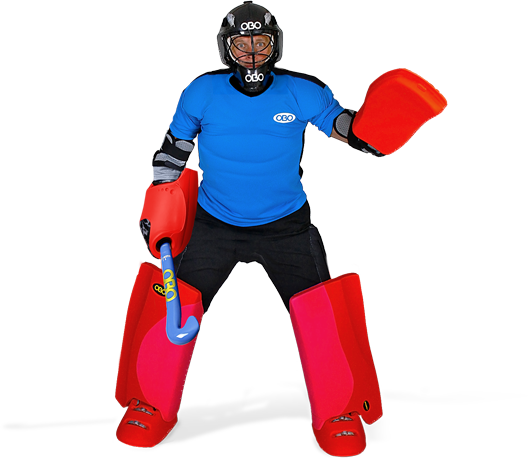KEEPERS RESOURCES

Penalty Strokes
When the umpires whistle blows and their arms go in different directions most goal keepers cringe with the thought of having to save a penalty stroke. Usually because we all know the umpire is wrong. But no matter how much we complain it is a fact of life that the umpire always thinks they are right and will not reverse their decision. “Bring on the third umpire” are thoughts that often go through my head.
Defending a Penalty Stroke can be a very daunting thing. Generally everyone is sure that the ball is going to go into the back of the net, except for the keeper. There are a number of things that a keeper can do to prepare for a stroke:
- Research
- Reflex work
- Practice
- Mental rehearsal
- Relax and set
- Focus on the ball
- Save the ball
Research:
To make ourselves better prepared to save a penalty stroke it is important that all that can be done before the game is done. Researching players who take strokes can never be done enough. Kath Partridge (one of the worlds greatest goal keepers, dual Australian Olympian, now coach) introduced me to a very easy way of keeping a journal of players taking strokes. All it includes in it is a picture of a goal and the position that the player flicks the ball. Following this you are to note the number and name of the player taking the stroke.
Reflex work:
Reflex training is an exceptional way to improve our ability to save a penalty stroke, seeing the majority of penalty strokes are saved by our reflexes. This is easily done by having balls lined up at the 7 yard spot in groups of about 10. The next step is to get someone to continually flick the balls at you, not giving you enough time to see the action of the flicker but only the movement of the next ball. This is designed to get you moving in all different directions and not thinking too much about where the ball is going. This can also be done very effectively with a bucket of tennis balls.
Practice:
If you never practice penalty strokes how can you be expected to save any. I myself hate practising penalty strokes and sometimes do anything to get out of it. You need to make it fun and challenging for yourself, (or the keeper you are coaching) to feel positive about it. Sometimes I get the stroke takers to tell me where they are going to put the ball. This helps getting the keeper used to moving and diving at the ball. It always makes it a more positive experience for the keeper. Another good idea is too play minor games and when an infringement occurs in the circle award a stroke. The more you practice the better you will get.
Mental rehearsal:
Before each stroke I mentally rehearse making up to 10 saves. This process takes around 3-4 seconds to complete. The saves that I rehearse include 3 on the right side, 3 on the left side and 3 in the middle of the goal. On each side I am seeing myself saving a high ball, a low ball and a ball in the middle region. I believe that this is invaluable for me.
Relax and set:
Similar to my personal golfing strategy, I like to relax before each stroke. For me this is a simple breathing exercise. I fill my lungs with fresh air and then exhale slowly. This relaxes my shoulders and clears my head of thoughts that might be clouding my ability to save strokes. This helps me set in a position that I can easily explode to make saves. For you this position may be different, for me I am set slightly on my toes with my body weight forward, hands up and not tense at all.
Focus on the ball:
Focusing on the ball is an essential element in saving a stroke. Players today can do all sorts of things with their sticks, thus making it very hard to read where the ball is going. I focus on the ball and not on the stick thus bringing into effect all the work I have done on my reflexes. Focusing on the ball does not mean looking at the ball but actually focusing on the dimples in the ball so that it is the only thing that you see and your mind is not wandering from the task at hand –
saving the ball.
Save the ball:
Hmmm….This should be easy. Let me know how you go.
Please use these tips as a guide only and use what works for you. Many people have said things to me over the last 12 years, I have taken some on board and others have been disregarded.
Good luck with the keeping!
Please note that OBO together with Rachel Durdin hold copyright over any material appearing on tips pages. We welcome the printing and distribution of these tips, provided that they are not sold, or used for financial gain. This paragraph must appear on all printed or distributed copies.
Comments
Leave Your Comments Below
















































